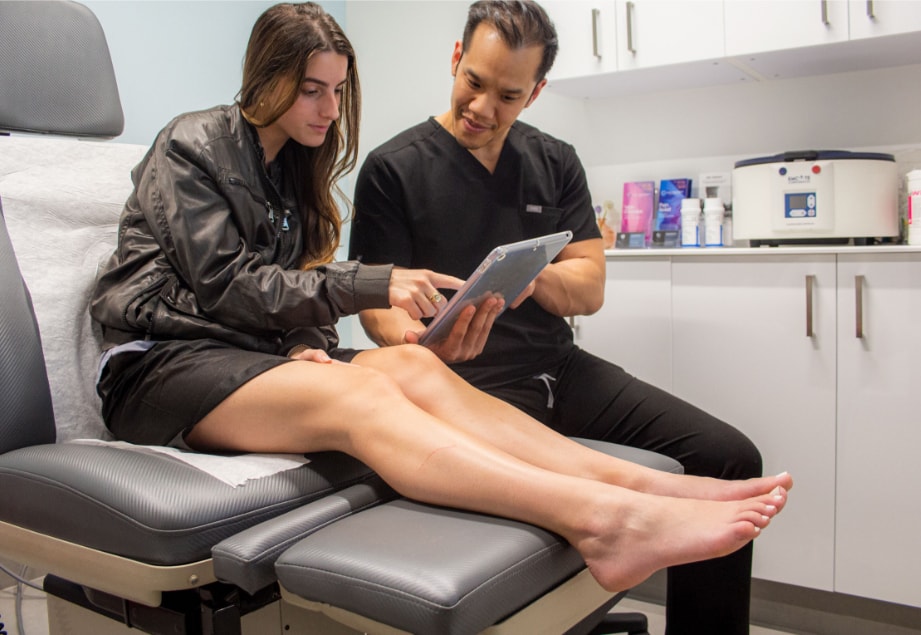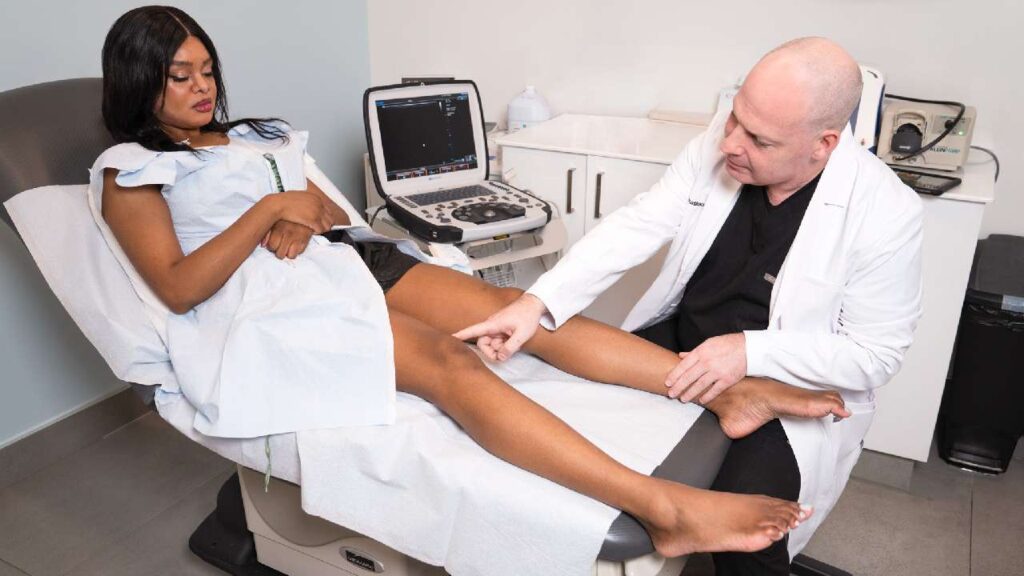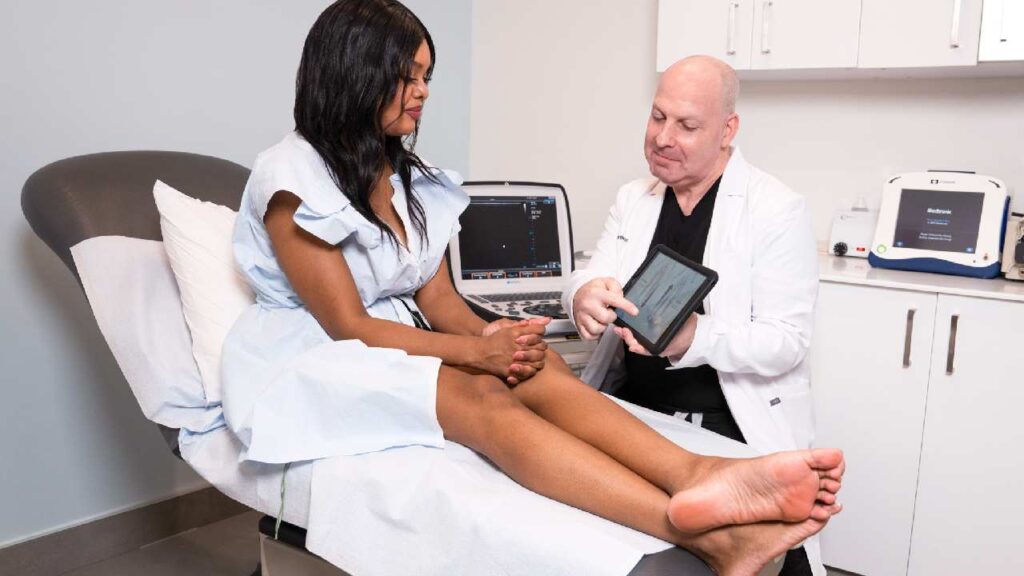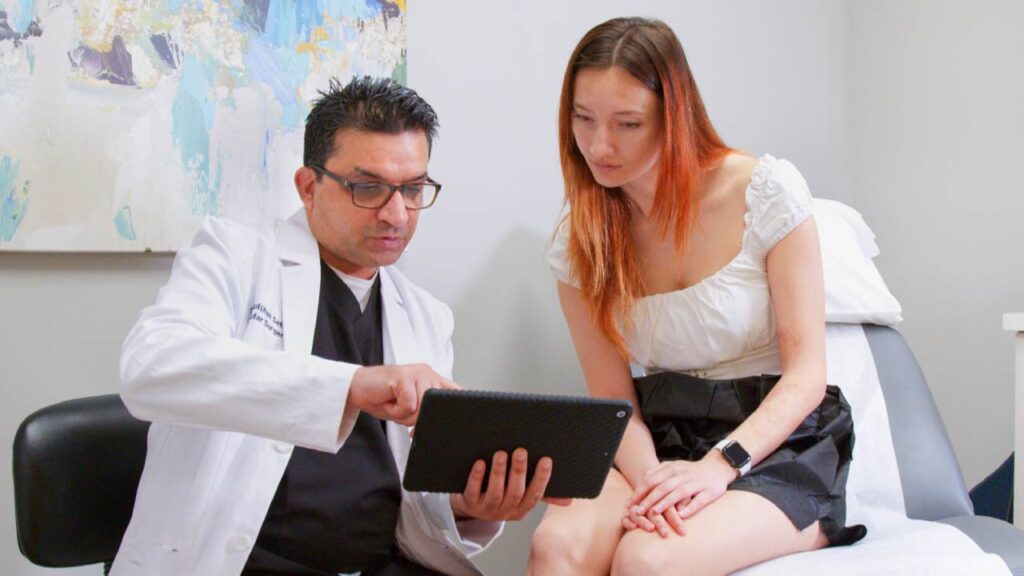Varicose Vein Treatment Before and After: What Is it Like?
The best vein doctors in New York have several innovative methods for treating spider veins and varicose veins, including radiofrequency ablation, endovenous laser ablation, and ablative techniques that utilize medical adhesives, rotating catheters, or sclerosing solutions to seal off faulty veins. Advances in venous medicine have largely replaced surgical removal of veins, which makes treatment faster, gentler, and easier to recover from, not to mention, less expensive than vein stripping surgery.
Our Harvard-trained vein specialists provide a comfortable, outpatient experience for vein ablation that’s completed in under 30 minutes, without general anesthesia or hospitalization. We pre-approve your insurance coverage and offer several customized vein treatment options so you can choose what appeals to you. Click HERE to visit our award-winning vein clinic in New York for rapid relief!

How Long Does Vein Ablation Take to Complete?
Traditional varicose veins surgery involves general anesthesia, multiple surgical incisions, stitches, and recovery time in the hospital. But our state-of-the-art varicose veins treatments take just 15-30 minutes, depending on the severity of vein damage and selected procedure. Since we access the vein through the skin, rather than performing varicose vein removal, there is no time spent on surgical prep or administering or awakening from general anesthesia. Our patients remain alert and can move around immediately after the procedure. Patients frequently book spider vein treatment and varicose vein treatment during their lunch break, since our procedures are so quick.
Typical Radiofrequency Ablation Varicose Veins Recovery Time?
Radiofrequency ablation (RFA), one of our preferred varicose vein ablation treatments, requires no recovery time whatsoever. Patients can walk, drive, shower, and exercise moderately right after treatment. Our NY vein doctors might recommend avoiding strenuous exercise for a few days, but otherwise, you can resume your regular routine.
There are no wounds to take care of, since we access the vein with a tiny electrode needle that doesn’t leave a large incision. All that’s required of RFA is a few minutes to treat your vein, and the procedure begins working immediately. The thermal energy heats the vein, prompting it to turn into scar tissue and disappear, thereby redirecting blood into healthy veins and eliminating the varicose vein.
Varicose Vein Removal Before and After: Does Treatment Work?
Our cutting edge vein treatments are highly successful because we use tools like Duplex Ultrasound to locate damaged veins, and also to monitor treatments as they move through the vein, to ensure successful ablation. Some vein specialists offer topical spider or varicose veins laser procedures, but these don’t utilize the technology needed to observe the treatment or identify problems in deeper veins that produce these surface veins. If you want a successful vein ablation procedure, choose board certified vein doctors in New York who consider your medical history, venous anatomy, and the source of your issues, and who are trained in the latest vein ablation procedures.
Vein Stripping vs. Ablation: What’s the Difference?
Vein stripping involves several deep incisions, typically near the groin and knee, to access a varicose vein and cut it out of the body. Vein ablation treats the vein inside the body, with either radiofrequency, lasers, sclerosants, vein glue, or mechanochemical catheters. There are several key differences. Minimally invasive vein ablation essentially minimizes all of the negatives of vein stripping surgery, including the discomfort, procedure time, risks, costs, level of anesthesia, recovery time, size of the wounds, and post-procedural care.
Most patients are better suited to minimally invasive vein ablation than vein surgery. But some patients do require surgery, so visit our New York vein specialists for an honest assessment. Our vein doctors use the least invasive technique possible, and will always explain whether treatment is optional or required.
Is Varicose Veins Treatment Surgery Faster?
Varicose veins treatment by surgery is not the fastest way to eliminate unhealthy veins. Surgery requires pre and post-procedural care, and the procedure itself takes longer than minimally invasive ablation, in part, because of general anesthesia. In addition, healing from surgery is a lengthier process that often requires some downtime from work and your typical routine. Minimally invasive vein ablation takes just a few minutes, and then you’re back on your feet and can head straight back to work.
Is Post Varicose Vein Surgery Care Complicated?
Caring for a surgical vein ablation procedure requires some extra steps that minimally invasive vein ablation does not. For instance, you’ll likely have some bandages to replace, wounds to care for, and more pain, bruising, and swelling than with minimally invasive procedures. There is a larger risk of infection, bleeding, and nerve damage, as well as possible complications from general anesthesia.
You’ll need someone to drive you home, and possibly stay to help you around the house for a few days. New surgical advances like ambulatory phlebectomy are aimed at reducing the hassles of vein surgery. So, if surgery is your only option, ask our vein doctors about newer surgical techniques.
Who Needs Vascular Surgery for Varicose Veins Treatment?
The majority of patients do not need vascular surgery for varicose veins treatment. There are several new alternatives that successfully resolve everything from tiny spider veins to large varicose veins, and even the vein disease that often causes them. If you have bulging veins or symptoms like leg heaviness, leg pain, restlessness, or fatigue in your legs, don’t delay booking a consultation at our NY vein clinic. Left untreated, varicose veins can lead to leg ulcers, hyperpigmentation, profuse bleeding, blood clots, and other unnecessary complications. Treatment is easy and rarely requires surgery, so talk to our vein experts today!
Any Radiofrequency Ablation of Varicose Veins Complications?
With newer procedures like radiofrequency ablation for varicose veins, complications are greatly reduced in comparison to surgery. Some patients will have a bit of swelling or a sensation of hardening near the treated vein, but these are normal and short-lived symptoms. If patients are at risk of blood clots, our vein doctors will have them wear compression stockings to enhance circulation. There is a negligible risk of infection or damage to surrounding tissue, but our vein doctors counter these with tools like tumescent anesthesia injected around the vein, and the highest level of cleanliness in our accredited vein clinics to prevent infection.
Is Swelling After Vein Ablation Concerning?
Mild swelling near the treated vein is common and no cause for concern. This typically resolves within 24-72 hours. It’s also normal to feel a hardening sensation as the vein seals shut and turns into scar tissue, and this is also a temporary result of vein ablation. Compared to vein stripping surgery, swelling is dramatically reduced and dissipates much faster, so you’re able to view your treatment results much earlier.
Is Endovenous Ablation Therapy of Incompetent Vein Required?
Some patients require endovenous ablation therapy of incompetent veins, particularly if they have vein disease, symptomatic veins, or issues like blood clots or deep vein thrombosis. For other patients, vein ablation is optional but still recommended if the patient is unhappy with how their spider veins or varicose veins look or feel.
Patients report a boost in their overall health and wellbeing after they treat their veins, since their self-confidence improves, along with their circulation. Since our doctors are board certified and our New York vein clinics are fully accredited, many of our vein treatments are fully covered by insurance. So, whether you require or simply desire vein treatment, we have affordable options for you!
When Should You Seek GSV Vein Treatment?
The best time to book GSV vein treatment is as soon as possible. The great saphenous vein (GSV) is a long blood vessel that runs from the foot to the groin, and it’s prone to valve failure, since it pumps blood against gravity to your heart. When a valve fails in the GSV, spider veins and varicose veins form as a result of blood pooling and elevating pressure in the vein. The earlier you seek ablation of the greater saphenous vein, the fewer spider veins and varicose veins you’ll have to treat. Book your consultation today to stay ahead of vein disease, and the resultant symptoms and complications.





